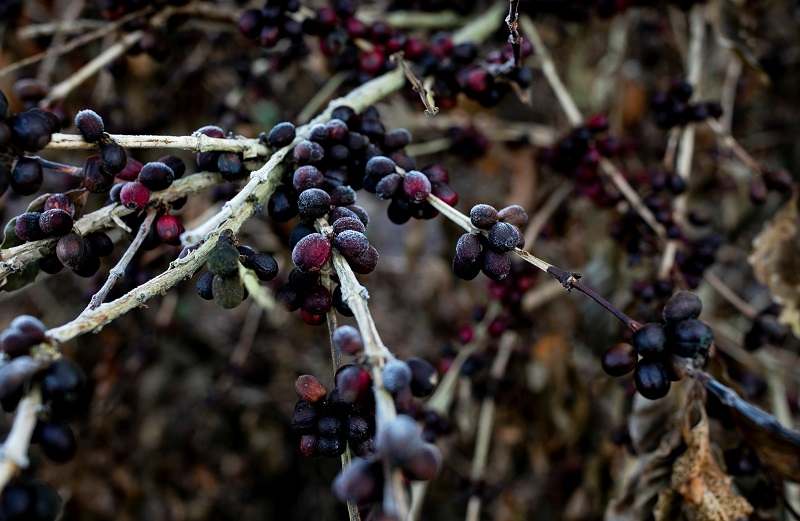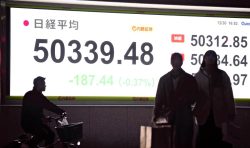
Frosted leaves and coffee cherries hang on coffee crops that were affected by frosts as a strong cold snap hit the south of the top Brazilian producer state of Minas Gerais, in Varginha, Brazil, on July 30.
16:21 JST, August 6, 2021
Coffee prices on the global market have been hovering at a 6½-year high, primarily due to concern about major producer Brazil being hit by extreme frost in its coffee bean belt.
A secondary factor appears to be the abundance of cash flowing around commodities markets amid global monetary easing, leading futures traders to bid higher as a hedge against a possibly slimmer coffee harvest.
In Japan, wholesalers following this trend will likewise soon raise their prices for coffee products.
Futures prices for Arabica beans ended July 30 at $1.7955 per pound (about 453 grams) — the highest weekly closing level since January 2015 — on the New York commodities market, which is the international benchmark for coffee prices.
Earlier in the week on July 26, futures prices peaked at $2.078 per pound, marking a more than twofold increase in just over a year, compared with 93 cents in June 2020.
The upward trend in raw coffee bean prices sharpened around the beginning of this year. This was about the same time that countries in North America and Europe, which account for 40% of global coffee consumption, started reopening cafes and restaurants as COVID-19 vaccinations advanced.
Then last month, coffee-producing regions in Brazil including Minas Gerais State in the country’s southeast, now in the winter season, were hit by a severe frost. This further pushed up futures prices as concern grew that the harvest would be affected.
The effects of the widespread monetary easing amid the COVID-19 crisis cannot be discounted.
The markets are drowning in money, with some flowing into internationally traded commodities, such as coffee beans, soybeans and wheat, as investment destinations.
UCC Ueshima Coffee Co., based in Kobe, will raise the prices of about 40 coffee products for household use in September.
The hike is UCC’s first in about seven years and chiefly in response to the price rises of raw coffee beans on the global market and the yen’s decline on the foreign exchange market.
Sticker prices are expected to rise by roughly 20%. The prices of those coffee products for business use, to be supplied to coffee shops and the like, will also be raised in stages, the company said.
As an official of the coffee industry has put it, “The wholesale prices for coffee beans are decided in the light of the market prices,” so the impact may even spread further in the months ahead.
The global consumption of coffee has grown steadily, due to increased consumption related to the economic growth of China and the spread of such coffee shop chains as Starbucks.
The U.S. Department of Agriculture expects that the global consumption of coffee will continue increasing in the future.
Top Articles in Business
-

Prudential Life Insurance Plans to Fully Compensate for Damages Caused by Fraudulent Actions Without Waiting for Third-Party Committee Review
-

Narita Airport, Startup in Japan Demonstrate Machine to Compress Clothes for Tourists to Prevent People from Abandoning Suitcases
-

Japan, U.S. Name 3 Inaugural Investment Projects; Reached Agreement After Considerable Difficulty
-

Toyota Motor Group Firm to Sell Clean Energy Greenhouses for Strawberries
-

SoftBank Launches AI Service for Call Centers That Converts Harsh Customer Voices into Softer Voices
JN ACCESS RANKING
-

Japan PM Takaichi’s Cabinet Resigns en Masse
-

Japan Institute to Use Domestic Commercial Optical Lattice Clock to Set Japan Standard Time
-

Israeli Ambassador to Japan Speaks about Japan’s Role in the Reconstruction of Gaza
-

Man Infected with Measles Reportedly Dined at Restaurant in Tokyo Station
-

Videos Plagiarized, Reposted with False Subtitles Claiming ‘Ryukyu Belongs to China’; Anti-China False Information Also Posted in Japan
























